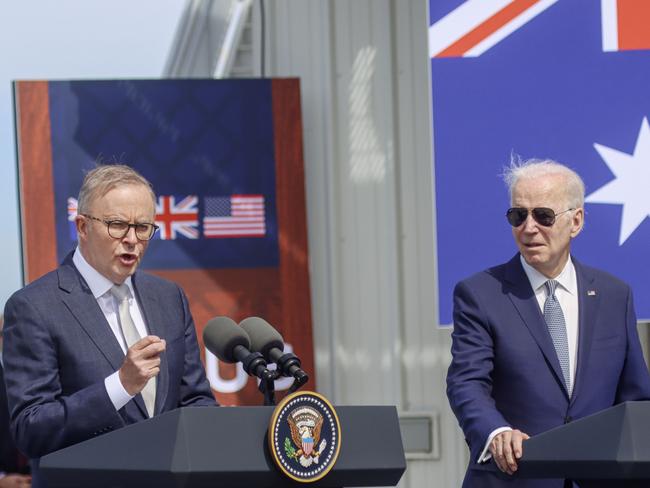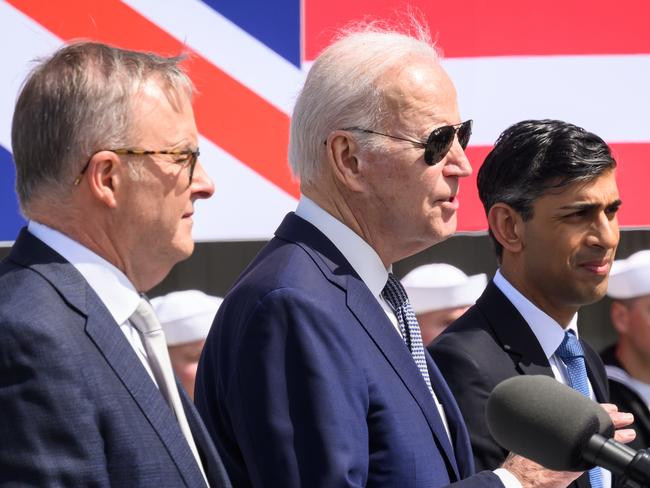Anthony Albanese omitted nuclear submarine bill of $368bn from historic AUKUS speech
It took some prodding from journalists for a pragmatic adviser to give up the most eye-catching new fact of Australia’s new nuclear subs deal.
As Anthony Albanese stood alongside Joe Biden to explain how America’s nuclear submarine technology would be shared with Australia, you had to spare a thought for Scott Morrison.
It had been 18 months since the former prime minister’s brainchild burst into life, only for the US President to forget Morrison’s name as he promised to share his military’s crown jewels with another nation for the first time in 65 years.
Biden’s embarrassing slip aside, the AUKUS pact would have been the cornerstone of Morrison’s prime ministerial legacy, had he had been interested in such a thing. Albanese used his admission that he wasn’t to convince Australians to support his vision instead.

Morrison, of course, was nowhere to be seen at San Diego’s Point Loma naval base on Tuesday, as his successor shook hands with Biden and UK Prime Minister Rishi Sunak on a deal that puts AUKUS squarely at the centre of his own legacy.
Albanese was cool, confident, composed – a leader a long time removed from those early nervous stumbles on the election campaign trail. (It probably helped that Biden remembered his name and warmly declared he was “proud to be your shipmate”.)
Looking out to the Pacific Ocean, past rows of sailors and dignitaries and reporters, Albanese said he could see “new frontiers in innovation to cross, new breakthroughs in technology to achieve, a new course for us to chart together”.
He did not mention seeing China, although it was hard to ignore the symbolism of the location, perched on a pier on the other edge of the ocean that the AUKUS partners are seeking to keep safe and free in the face of President Xi Jinping’s escalating aggression.
Sunak also found symbolism in the location, 60 years after John F. Kennedy’s famous address in San Diego in the wake of the Cuban missile crisis, when he spoke of the “higher purpose” in maintaining freedom, peace and security.
It would undoubtedly have been a touching reference for Caroline Kennedy, JFK’s daughter who was sitting in the crowd as Biden’s ambassador in Australia. She later hailed the announcement as an “incredibly historic” moment for all three countries.
There was, inevitably, some politics involved.

Biden repeatedly emphasised that Australia’s submarines would not be armed with nuclear weapons, in a pre-emptive bid to calm his left-leaning supporters who would otherwise fret over the risk to their nuclear non-proliferation obligations.
Sunak spoke mostly about a broader domestic defence spending blitz, setting the scene for his budget two days later that he desperately needs to lift his unpopular government.
For his part, Albanese did not mention the most eye-catching new fact of the day. Indeed, nowhere in the mountain of paperwork produced by his government could you find the number everyone wanted to know: the total nuclear submarine bill of up to $368bn. It took some prodding from journalists for a pragmatic adviser to give up that staggering figure.
Meanwhile, Albanese, Biden and Sunak happily embraced the pomp and ceremony.
“You are all the best,” the President told his colleagues as Navy Band Southwest played them off the stage.
“We’re going to be the best in the world, the three of us.”
Albanese will be 80 by the time Australia’s first nuclear submarine hits the water, and Biden will be 100. If they are there for that grand unveiling, they certainly won’t be in office.
But to borrow a Labor attack line against Morrison – all announcement and no delivery – Albanese will know how much hard work lies ahead.
Tuesday will go down as one of the most important days of his prime ministership. How exactly it is remembered depends on what he does next.
Originally published as Anthony Albanese omitted nuclear submarine bill of $368bn from historic AUKUS speech




